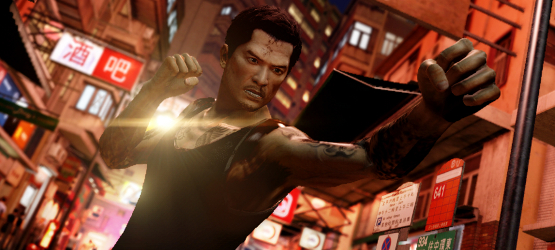It’s strange, actually. Like Deja Vu. I played the first ten or so minutes of Sleeping Dogs over two years ago. At that point, it was known as True Crime: Hong Kong, and was being published by Activision. Showing plenty of promise even then, I called it “a game to watch.” For one reason or another, Activision pulled the plug on True Crime, leaving all of United Front Games’ work floating in limbo. Eventually, Square Enix picked up the rights to the game, rebranded it, and are now left to prove whether or not they should have let Sleeping Dogs lie.
The game begins with protagonist and undercover cop, Wei Shen, being briefed by his superiors about his role in taking down the notorious organized crime syndicate, the Sun On Yee. It’s an inside job. Wei must enlist as a Triad foot soldier, doing the dirty work of his Red Pole bosses. Theft, extortion, even murder are commonplace for a hardened criminal caught up in the violent world of street gangs, but as an officer of the law, Wei’s morality is constantly called in to question.
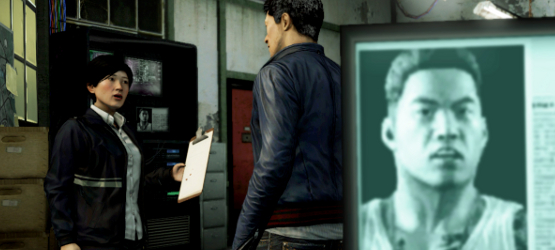
Not just his morality, but his loyalty. Wei grew up in Hong Kong, in the Prosperity District, right alongside these thugs. And even his years as an undercover cop here in the States may not be enough to sway his loyalties to his homeland and its people. He’s only doing his job, but the deeper Wei gets, the more he embraces his place within the Sun On Yee. The struggle going on in Wei’s conscience makes for an interesting character to watch develop, never really knowing for sure which side he’s going to favor.
You couldn’t blame, Wei. The things he’s forced to do, the things he sees—it could change anyone. Sleeping Dogs is gritty, and incredibly violent. Not violent just for the sake of being violent, but because it is the reality that the Sun On Yee live.
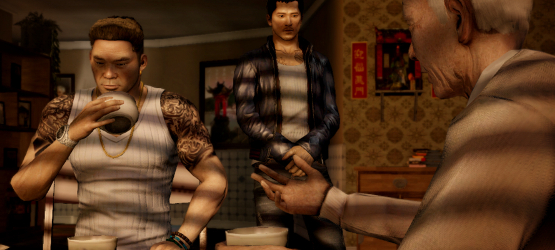
Missions vary, with some being elaborate heists or showdowns with rival gangs; while others are menial tasks. That said, you’re never made to feel like Wei is a simple errand boy. And despite starting off as only a foot solider, Wei rises the ranks quickly and the crime he’s involved in escalates. If you do find yourself on a mission where you feel like gofer, it’s to build a relationship, or to set up for something bigger.
Wei isn’t just working for the Sun On Yee, he also cracks cases for the HKPD, busts drug rings, street races, and helps out citizens in need. And he communicates with the rest of the cast using is cell phone. Anyone who has played GTAIV may have just shuddered at hearing the mere mention of a cell phone, but I assure you it isn’t ever an annoyance. If anything, it’s a useful tool that goes far beyond simply contacting others, using it to hack into surveillance and security systems, triangulate cell towers to trace phone calls, or even snap pictures for evidence.
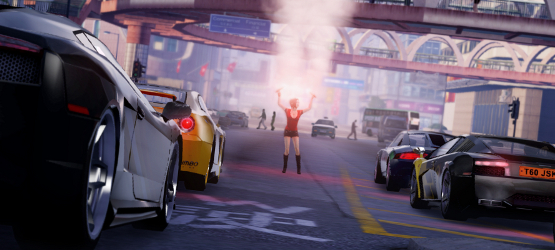
Depending on the task completed, Wei earns points toward his Triad, Cop, or Face levels. Each of the different meters when brought to the next level unlocks certain skills or perks. It helps develop Wei’s capabilities, but doesn’t do enough to weigh in on the decisions you make, and has little affect on the world around you. The mark was missed in fleshing out a full scale morality system that changes the way you play or encourages subsequent replays.
Instead it builds Wei’s repertoire of attacks which he’ll need to take down increasingly dangerous foes. Combat starts off light, focusing on hand-to-hand Kung Fu. But since he’s fighting large groups of enemies at any given time, the added attacks become essential for survival. In no time, Wei will be performing combinations, Judo-like grapples and tosses, mixing in some cringe-worthy power attacks. Patience is a virtue, and sometimes waiting to be attacked and performing successful counterattacks are necessary—especially if encountering a weapon-wielding enemy. The Arkham City-inspired fighting is decidedly more focused on Martial Arts, and is more satisfying.
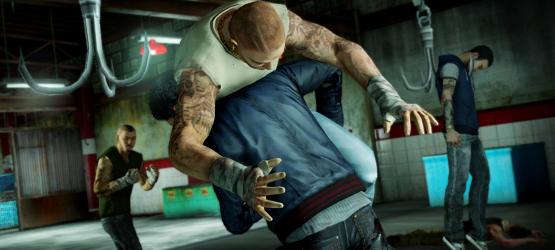
While grappling, it’s important to be aware of your surroundings as each area provides many opportunities for deadly environmental interactions. More often than not, there are at least a handful of places that Wei can slam an enemy into or onto, each one more gruesome than the next. It’s hard not to wince seeing a man’s face slammed into the whirring blade of a table saw, but you’ll do it again and again because it’s brutal and it’s effective.
Sometimes situations call for heavier artillery. Firearms aren’t as common on the streets of Hong Kong, therefore missions involving shooting are few, and happen more toward the end of the game. For gunplay, Sleeping Dogs turns from a beat-em-up to a duck and cover-based third-person shooter. There isn’t much variety in weapons or situations, but Wei’s agility lends to quick, but slo-mo, vaults over cover, lots of running and gunning, and foot chases.
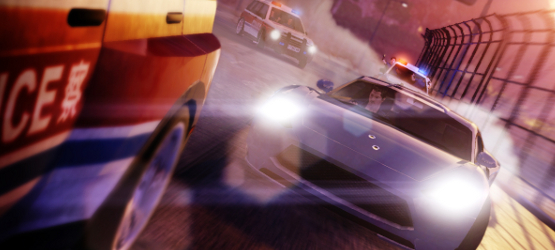
Not just on foot, Wei finds himself giving chase in vehicles often. Whether it’s fleeing a scene or a suspect is trying to escape, there are plenty of fast-paced, edge-of-your-seat driving situations. More intense yet, is leaping out of a moving car at high speeds to the roof of another to subdue the driver. It’s unrealistic, sure, but it’s easy enough to pull off in the game because cars and motorcycles handle so well. Driving never feels like a chore, to where the game’s included taxi option isn’t worth bothering with. And although Hong Kong is huge, driving from one side to another isn’t intimidating.
For a city so large, it’s filled heartily with people. Most have little interaction with the game’s characters, but their movements and own lives are more believable and realistic than other open world titles. Some citizens offer up side-missions, while others sell you goods or services that buffer certain abilities. For example, paying for a massage from a lovely lady bolsters the effects of the face meter. Talk about a happy ending! You might as well take advantage of it, because Wei earns a ton of cash during the game—but is rarely given the opportunity to spend it. Because of this, there is barely a sense of economy in Sleeping Dogs. It just doesn’t matter.
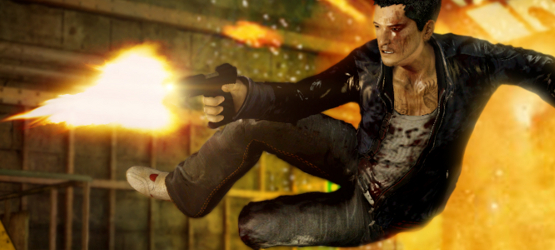
What does matter is this: Sleeping Dogs is an all-around excellent game.
The story of loyalty and inner turmoil is told through well-scripted dialog and expert voice acting during cutscenes. Combat, gunplay, and driving are each equally satisfying, well-balanced, and plenty. The living, breathing underworld of Hong Kong is expertly recreated. The sum of all of these parts give Sleeping Dogs that classic Hong Kong Kung Fu action flick vibe, putting you in the director’s chair. There may not be any multiplayer, however, the sheer volume of content and the added Social Hub will keep you playing long after the credits roll. Rockstar Games needs to take note and step their game up for Grand Theft Auto V—Sleeping Dogs has set the bar very high.
-
Gripping story of loyalty and turmoil.
-
Combat is deep and satisfying.
-
Huge, living world with tons of content.
-
Good Cop, Bad Cop system doesn't affect outcome.
-
Money is rarely used.
